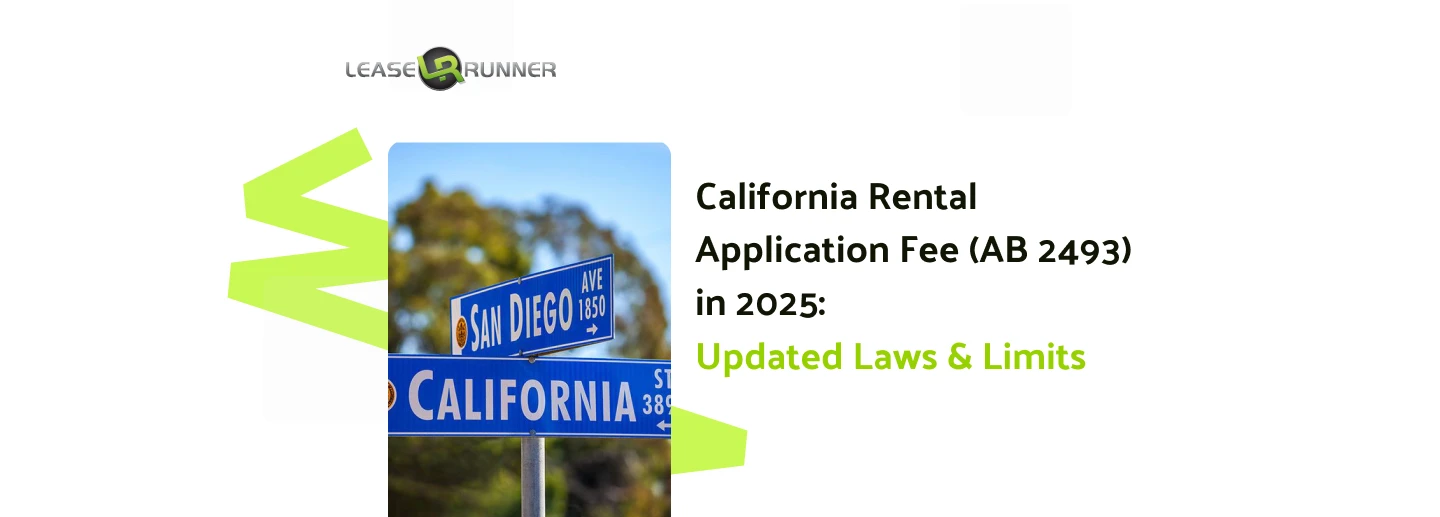With updated laws and rising costs of living, the California rental application fee remains a hot topic in 2025. State regulations set clear boundaries, but many renters and landlords still misunderstand their rights and obligations. Our guide will break down all the facts so you can approach the rental process with confidence!

What Is a California Rental Application Fee?
A California rental application fee is a charge tenants pay landlords for the costs of processing an application during the rental application process in California. The fee covers tenant screening costs in California, which landlords must follow by law.
The fee pays for two types of expenses:
- Third-party reports: credit checks, background check fees, eviction history checks, and income or employment verification.
- Administrative costs: paperwork processing, calling references, and preparing an itemised receipt rental application fee if tenants request it.
This fee is not a deposit and does not guarantee approval or unit reservation. Paying grants landlords permission to start screening applicants, but it does not secure the rental.
Under Assembly Bill 2493 (AB 2493), landlords must refund the unused rental application fee within seven days if screening does not happen. If landlords collect multiple application fees but only review one applicant, they must refund the others.
The fee works as a pass-through cost. Landlords pay screening companies the exact screening price. They keep only the part that covers administrative work. California’s maximum rental application fee depends on the actual screening cost. It adjusts annually for inflation through the CPI adjustment on the rental application fee in California. In 2025, the fee limit is about $65.
Landlords cannot charge the fee if no unit is available, unless tenants give written permission. Some landlords may waive the application fee for an apartment as a perk to attract renters. Many renters wonder, “Is the rental application fee refundable in California?” Yes, if screening does not start, or if part of the fee goes unused. Tenants can get a refund of the unused portion of the rental application fee in such cases.
Understanding the California rental application fee limit helps tenants and landlords know their rights and duties in the rental application process in California.

Are Rental Application Fees Legal?
Yes, rental application fees are legal in California, but they must follow strict state laws. Landlords can only charge for tenant screening costs in California, such as background check fees and credit reports.
Overcharging beyond California's maximum rental application fee or using fees for unrelated expenses is illegal. Landlords who collect fees but do not screen applicants must refund unused rental application fee amounts.
The law protects tenants' concerns about whether the application fee is refundable in California. And yes, the law requires landlords to refund any unused portion of the rental application fee if the tenant screening is not completed or if the fee exceeds the actual costs incurred under Assembly Bill 2493 (AB 2493).
Landlords must also provide an itemised receipt for the rental application fee if tenants request one. Fees should reflect actual screening costs and be handled transparently. Some landlords opt to waive the application fee for an apartment to appeal to applicants. These rules keep the rental process fair for both sides.
California Rental Application Fee Law in 2025
In 2025, California’s rental fee rules follow California Civil Code Section 1950.6 with updates under Assembly Bill 2493. These laws set the California rental application fee limit tied to actual screening costs and inflation adjustments via the CPI adjustment rental application fee in California.
Legal Basis: California Civil Code Section 1950.6
Based on the California Civil Code Section 1950.6, landlords must:
- Charge no more than the allowable maximum (adjusted annually).
- Provide an itemized receipt if requested.
- Refund any unused portion of the fee if the screening was not completed.
These rules protect applicants from excessive or unfair charges while still allowing landlords to recover screening costs. Tenants can learn about verifying their rights and background checks through trusted tenant screening resources, like tenant background screening or credit verification tools, such as credit checks.
Maximum Application Fee in California Under AB 2493 (Effective 2025)
As of January 1, 2025, AB 2493 adjusts the maximum California rental application fee based on annual changes to the Consumer Price Index (CPI). You can see the breakdown of the maximum allowable application fee by year below.
The maximum fee applies per applicant and must not exceed the landlord’s actual out-of-pocket screening costs. Landlords are required to refund any unused portion of the fee and must not profit from the application process.
Refund Rules for Rental Application Fees in California
Knowing the refund rules for rental application fees in California helps tenants and landlords avoid problems. The state has strong rules about how fees are charged, used, and refunded. These rules keep the rental process fair and clear.
Important points include:
- Landlords can only charge up to the CA’s maximum rental application fee, which changes yearly with the CPI adjustment.
- Fees must pay for real tenant screening costs, such as background check fees in California and credit checks.
- Landlords must give an itemised receipt for the rental application fee when tenants ask.
- If screening is not done or fees are more than costs, landlords must return the unused portion of the rental application fee quickly.
- Paying the fee does not guarantee you will get the rental. This fee covers the cost to review your application.
- Some areas may have extra rules, so check local rules during the rental application process.
This guide helps everyone understand their rights and duties. Knowing these rules means fewer surprises for both renters and landlords.
Legal Requirements for Charging Application Fees

When landlords charge for applications, they must stick to specific rules that protect both sides. These include setting proper fee limits and caps, proper use of fees, clear transparency and disclosure, fair refund requirements, and explaining that paying fees does not guarantee approval of the rental unit.
Fee Limits and Caps
The California maximum rental application fee is regulated by law and varies each year. It is tied to actual tenant screening costs in California, plus a small administrative amount. Landlords cannot charge more than the set application fee limit. The CA's fee limit is adjusted annually through the CPI adjustment to keep fees fair and current.
Use of Fees
Funds collected must directly cover legitimate tenant screening costs in CA, such as background check fees, credit reports, eviction history checks, and verifying employment or income. The fees cannot be used for property maintenance or other unrelated expenses. This ensures fees remain fair and transparent.
Transparency and Disclosure
Landlords must provide an itemised receipt for the rental application fee upon tenant request. This receipt must list specific charges covered by the fee. Clear disclosure before or at the time of payment is also required.
Based on that, applicants understand what they are paying for and how fees are used during the rental application process.
Refund Requirements
If the screening never starts or is not completed, landlords must return the unused portion of the rental application fee within seven days. Prompt refunds protect applicants from unfair charges.
Non-Guarantee of Approval
Paying a rental application fee does not guarantee rental approval or unit reservation. The fee only covers the landlord’s cost for review. Tenants should know that paying their fee starts but does not guarantee success in the process.
State and Local Variation
While California sets strict statewide rules under AB 2493, local jurisdictions sometimes add further restrictions or specific fee limits. Tenants and landlords should check local housing agency guidance for any additional regulations impacting application fees in their area.
Average Application Fees – California vs. Other States
In California, average rental application fees centre around $65, the California rental application fee 2025 limit, which covers comprehensive tenant screening costs. Compared to other states, California’s fees tend to be higher but balanced by strict caps and transparency rules.
States like New York and Massachusetts have much lower caps or bans. Tenants should understand these differences to anticipate application expenses when moving between states or cities. Here is a summary table for you to quickly compare:
For more details on how long tenant screening typically takes and the rental application timeline, tenants can review useful resources about the tenant screening duration and rental application process length.
How Landlords Can Set Up a California Rental Application via LeaseRunner?

For landlords looking to streamline the rental process in 2025, using a platform like LeaseRunner can make handling the California rental application fee, forms, and screenings much easier!
Step 1: Create a LeaseRunner Account and Add Your Property
Start by signing up for a landlord account on LeaseRunner. Once registered, you can input your California property details (address, unit type, and rent amount) into your dashboard. This information connects future applications to the correct rental listing.
Step 2: Send the Application to Prospective Tenants
After adding the property, you can send a free digital residential rental application in California directly to potential tenants, along with tenant screening reports (credit, background, eviction, income verification). Enter the prospective tenant’s email, and LeaseRunner sends them a secure link to complete everything online.
Step 3: Applicants Complete the Online Form
Once prospective tenants receive the secure link, they can begin the rental application online. The application form itself is free; no California rental application fee is charged by LeaseRunner.
However, if the landlord follows our suggested tenant screening checklists and provides suitable reports (such as credit, background, or eviction checks), they can choose whether the tenant or the landlord pays for those reports. These fees go directly toward the actual cost of the screenings. LeaseRunner’s Premium Screening is within the California rental application fee cap.
Important: No charges are processed without the applicant’s prior digital authorisation.
Applicants will fill in their personal information, rental and employment history, and provide references. The online format allows them to complete the application conveniently on their own time.
Step 4: Review Applications and Screening Results in Real Time
Once submitted, LeaseRunner alerts you immediately. You can log into your dashboard to review the full application, credit report, background check, and supporting details, all in one place. This allows you to make informed, compliant decisions without delay.
Submitting a Rental Application in California as a Tenant

A California rental application fee is usually required, and landlords often rely on digital screening tools. Whether applying online or in person, you should be prepared and responsive.
Application Fee Regulations
California law limits the maximum rental application fee that landlords can charge. This fee must cover only real tenant screening costs in California, such as background check fees in California or credit checks.
Landlords must follow strict guidelines to avoid overcharging or illegal practices. Some landlords may choose to waive the application fee and apartment costs as an incentive during competitive rental markets.
First-Come, First-Served Processing
Under Assembly Bill 2493, landlords can process applications on a first-come, first-served basis. This means they accept and review applications in the order received. This process helps keep things fair and organised. However, landlords must notify applicants promptly if the unit is no longer available to avoid unfair fees or delays.
Screening Criteria Disclosure
Before collecting any fees, landlords must disclose the tenant screening criteria they use. Applicants should know what checks will be run, including credit, criminal, and rental history. Transparency about these steps helps applicants understand the process and set realistic expectations.
Applicant Rights
Applicants have the right to fair treatment during the screening process. They can request information about the checks run and receive an itemised receipt for the rental application fee. Tenants applying for subsidised or Section 8 housing have extra protections. To ensure equitable access and fair evaluation, it’s important to know how to properly screen Section 8 tenants.
Non-Refundable Fees and Refunds
Although many fees are non-refundable, tenants often ask, “Do you get the application fee back if denied?” In California, if landlords do not complete the screening or if fees exceed actual costs, they must refund unused fee portions. Knowing when fees are refundable protects applicants from unfair charges.
Application Form Details
Rental applications typically ask for personal information. For example, income, employment, and rental history are several things you should notice. Providing accurate and complete data speeds up the review. Some landlords use online forms to streamline this step. If it's the case, the tenants can track their application status more easily.
Anti-Discrimination Protections
California law prohibits discrimination based on race, gender, religion, disability, or source of income during the rental application and screening. All applicants must receive equal consideration, ensuring fairness and compliance with state and federal laws.
Use of Online Platforms
Many landlords now use online platforms to collect applications and fees. These systems can run credit and background checks quickly. However, tenants should ensure their data is secure and that they receive disclosures outlining the screening criteria and fee uses.
California Rental Application Denial and Adverse Action
Being denied a rental can be frustrating. But California law ensures tenants’ rights at every step. Understanding the denial process and how landlords must follow rules helps tenants respond properly and protect their interests.
What Does Rental Application Denial Mean?
A rental application denial means the landlord rejects your request to rent the unit. Common reasons include a low credit score, poor debt history, insufficient income, or a past eviction. Knowing these can help applicants prepare stronger submissions.
What Is an Adverse Action?
An adverse action is any negative step landlords take, such as rejecting an application, requiring a higher security deposit, or needing a co-signer. The Fair Credit Reporting Act (FCRA) defines these actions and sets rules to protect applicants.
Landlord Obligations Under California and Federal Law
Landlords must send an Adverse Action Notice if they deny an application based on a credit or background report. The notice must include the reason for denial, credit bureau contact info, and the tenant's right to request a free credit report.
The notice must also state that the credit bureau did not make the decision to deny the application. This formal notification ensures transparency and protects both the landlord and the applicant by providing a clear paper trail as required by the FCRA.
Tenant Rights After an Application Denial
Tenants have the right to receive the adverse action letter and get a free copy of their credit report. If any information is wrong, they can dispute it to correct their records, helping future applications.
This free report must be requested directly from the credit reporting agency within 60 days of receiving the denial notice. Tenants should also know they have the right to a dispute process with the bureau to have inaccurate or outdated information corrected.
How to Respond If Your Application Is Denied?
Check the denial notice carefully. Review your credit report for errors, and fix any issues. Gather documents that prove your creditworthiness. These steps improve your chances next time you apply. You can formally dispute errors with the credit bureaus, providing documentation to support your claim.
Additionally, consider writing a letter to the landlord to clarify any misinformation or provide alternative proof of income, such as recent pay stubs or bank statements.
Best Practices for Landlords in California
To run a smooth rental business in California, especially with evolving laws around the California rental application fee, landlords must take note:
- Always charge within the legal fee limit, updated annually: California law strictly caps the rental application fee, and the maximum amount adjusts annually based on the Consumer Price Index (CPI).
- Use standardized applications with clear disclosures: A standardized rental application form needs to have all necessary fields for personal, rental, and employment information, required legal disclosures about how fees will be used, and clear consent sections for background and credit checks.
- Screen all applicants equally to avoid fair housing violations: Discrimination is illegal under both federal and California fair housing laws.
- Provide receipts for application fees and keep screening records: Applicants have the right to request an itemized receipt showing how their application fee was spent.
- Respond promptly to applications and notify tenants of decisions: Promptly reviewing applications and informing applicants of acceptance or denial helps to build trust and a good landlord reputation.
- Stay current with local rent control ordinances and fair housing updates: California’s rental laws vary widely by city and county.
- Use digital platforms to streamline and document the entire process: Technology can simplify managing applications and fees. Consider using trusted digital tools like LeaseRunner, RentSpree, or similar platforms.
Final Takeaways
California rental application fee guidelines in 2025 remind landlords of the importance of compliance, consistency, and clear communication. As fee caps adjust each year, both landlords and tenants should stay updated with the law updates and the new guides by LeaseRunner!
FAQs
Q1. Do you get your application fee back if you're denied?
In most cases, California rental application fees are non-refundable, even if you're not selected. However, if the landlord does not run a background or credit check, they are legally required to refund any unused portion of the fee. Applicants have the right to ask for a receipt showing how the fee was used.
Q2. Why are apartment application fees so expensive?
California rental application fees cover the real costs of screening a tenant. While the fee may seem high, state law sets a maximum cap that adjusts annually (e.g., $59.67 in 2025 under AB 2493). Landlords cannot charge more than the legal maximum, even if their actual costs are higher.
Q3. Are application fees legal in California?
Yes, application fees are legal in California, but they’re strictly regulated. Landlords can only charge up to the state-mandated maximum, must use the fee solely for screening purposes, and must provide a receipt upon request. Overcharging or misusing the fee can result in legal penalties.
Q4. Can a landlord charge different application fees to different people?
No. In California, landlords must charge all applicants the same application fee for a given rental unit. Charging different fees can violate fair housing laws and is considered discriminatory, unless the difference reflects a documented, actual cost (and still remains under the legal cap).







